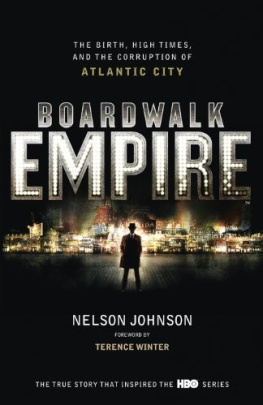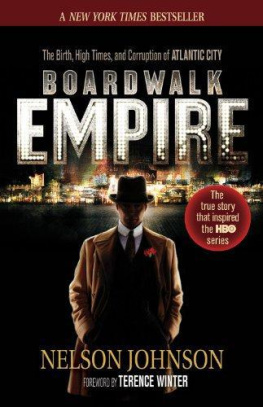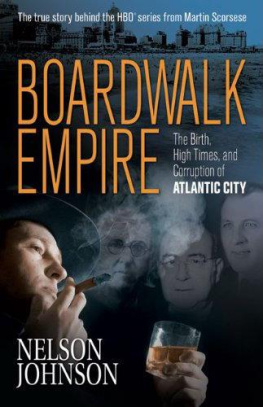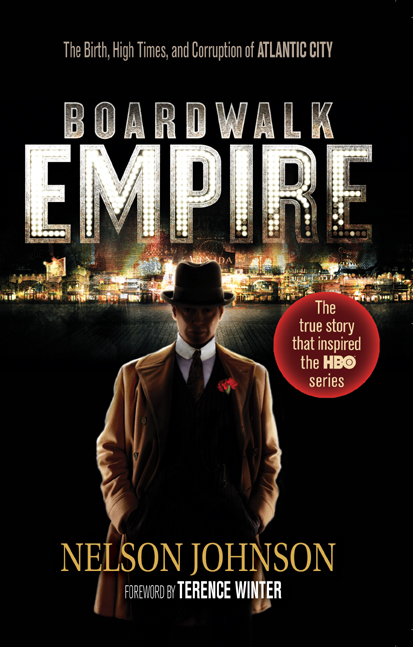Cover Art and Interior Photographs 2010 Home Box Office, Inc. All Rights Reserved.
HBO and Boardwalk Empire are service marks of Home Box Office, Inc.
Plexus Publishing, Inc.
All rights reserved. No part of this book may be reproduced in any form without the written permission of the publisher, except by a reviewer, who may quote brief passages in a review.
Boardwalk empire: the birth, high times, and corruption of Atlantic City / by Nelson Johnson.
p. cm.
Includes bibliographical references and index.
1. Atlantic City (N.J.)--History. 2. Atlantic City (N.J.)--Social life and customs. 3. Atlantic City (N.J.)--Biography 4. Political corruption--New Jersey--Atlantic City--History. I. Title.
Cover design by Lisa M. Conroy
I acquired my passion for the printed word.
Shortly after sunrise on a cool August morning in 1987, my friend Chris and I walked along the beach in Atlantic City, its Boardwalk and hotel-casinos looming directly to our right. With our ties undone, bellies full, and pockets empty after a night of gambling, drinking, and general debauchery, we were completely exhausted and wiped out financially; we couldnt have been happier. As we trudged along, the waves crashing at our feet, I reached into my pocket and pulled out the last few coins I had. Twenty-three cents. I hurled them all into the Atlantic Ocean and turned to Chris. Now were really wiped out. After a good laugh, we headed up to the Boardwalk and started our long trek home, two hard-luck characters with another fun story to tell about our time in Atlantic City. What I didnt know then was that versions of this scenario had been playing out there for over 100 years.
Ever since the railroad made it accessible to the average working person, Absecon Islandor Atlantic City, as it came to be knownwas The Worlds Playground, a kingdom of dreams built on sand, a place where, for a reasonable sum of money, any man, woman, or child could be treated like visiting royalty. With luxury hotels, theaters, and restaurants lining its famous Boardwalk, there was nothing the city didnt offerlegal or illegal. Food, drink, and entertainment of all kinds, from highbrow to low. If you couldnt find it on the Boardwalk (or on one of its many side streets), it didnt exist.
When I was first approached by HBO to use Nelson Johnsons book as the basis for a TV series, my biggest challenge was choosing a time period in which to set it. From the Gilded Age of the Robber Barons, to the Roaring Twenties and the Prohibition Era, to the Glamorous 1950s of Skinny DAmato, to the citys decline and subsequent resurgence with the advent of legalized gambling in the 1970s, Atlantic City and its people have been nothing if not compelling.
Ultimately I settled on the 1920s of Atlantic Citys legendary Treasurer Nucky Johnson (fictionalized as Nucky Thompson in the HBO series), which was the era that most struck my creative fancy. Atlantic City at that time was a place of excess, glamour, and, most of all, opportunity. Loud, brash, colorful, full of hope and promiseit was a microcosm of America. A place of spectacle, shady politics, fast women, and backroom deals, but also a real community with real people, not only on its Boardwalk, but in its churches, schools, and neighborhoods. It was a place of real Americans, a melting pot of ideas and cultures.
On my last trip there, I walked the same streets as Nucky, stood in his hotel lobby, ate in one of his favorite restaurants. I strode the Boardwalk where he reigned as king, looking out at the vast ocean that he considered his own. I was taken back in time and imagined the place as it had been, and though I enjoyed it all immensely, I neednt have traveled so far to recreate the experience. Nelson Johnson had already taken me there in his wonderful book.
Terence Winter
Emmy Award-winning writer of The Sopranos
and Executive Producer of Boardwalk Empire
Luxury hotels werent something she knew about firsthand. Until now, she had never been inside the Ritz Carlton. The closest shed come to the grand hotel was when walking on the Boardwalk. But here she was in the anteroom of a large suite of rooms, seated in a chair that nearly swallowed her. She was frightened, but there was no turning back. She sat there trembling, folding and refolding her frayed scarf.
As a housewife and summertime laundress in a boardinghouse, she felt out of place and her nervousness showed. Flushed and perspiring, she noticed that her dress and sweater needed mending and she grew more self-conscious. It was all she could do to keep from panicking and running out. But she couldnt leave. Louis Kessel had told her Mr. Johnson would see her in a moment and she had to wait. To leave now would be embarrassing and, worse still, might offend Mr. Johnson. If it werent winter, and if there werent so many unpaid bills, she never would have worked up the courage to come in the first place. But she had no choice; her husband had been a fool and she was desperate for her family. Louis Kessel appeared a second time and motioned to her. She followed him, not knowing what to expect.
As she walked into Mr. Johnsons sitting room, he took her hand and greeted her warmly. It was several years since she met him at her fathers wake, but Johnson remembered her and called her by her first name. He was dressed in a fancy robe and slippers and asked what was troubling her. In an instant her anxiety vanished.
In a rapid series of sentences she recounted how her husband lost his entire paycheck the night before at one of the local gambling rooms. He was a bakers helper, and during the winter months his $37 each week was the familys only income. She went on and on about all the bills and how the grocer wouldnt give her any more credit. Johnson listened intently and, when she was finished, reached into his pocket and handed her a $100 bill. Overwhelmed with joy, she thanked him repeatedly until he insisted she stop. Louis Kessel motioned, telling her there was a car waiting to drive her home. As she left, Johnson promised that her husband would be barred from every crap game and card room in town. He told her to come back any time she had a problem.
Enoch Nucky Johnson personifies pre-casino Atlantic City as no one else can. Understanding his reign provides the perspective needed to make sense of todays resort. Johnsons power reached its peak, as did his towns popularity, during Prohibition, from 1920 to 1933. When it came to illegal booze, there was probably no place in the country as wide open as Nuckys town. It was almost as if word of the Volstead Act never reached Atlantic City. During Prohibition, Nucky was both a power broker in the Republican Party and a force in organized crime. He rubbed elbows with presidents and Mafia thugs. But to Atlantic Citys residents, Johnson was hardly a thug. He was their hero, epitomizing the qualities that had made his town successful.


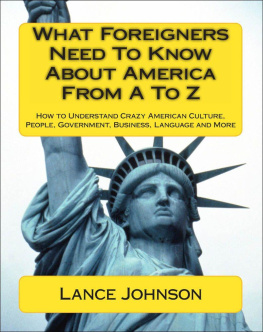





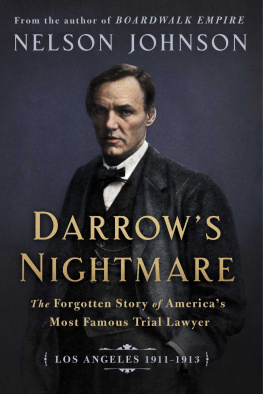
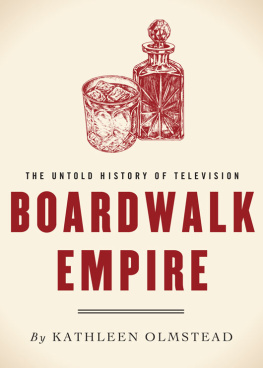
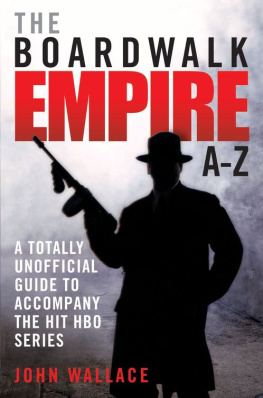

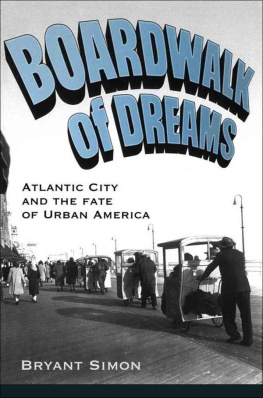
![Pileggi - Casino [eBook - NC Digital Library]: Love and Honor in Las Vegas](/uploads/posts/book/227422/thumbs/pileggi-casino-ebook-nc-digital-library-love.jpg)
